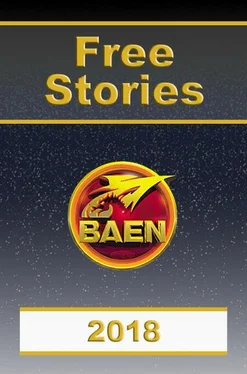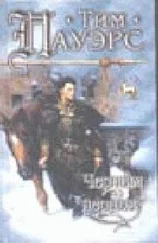Which was how, thirty-four T-years later, the Refuge System had come to be home to the Bolthole Complex, the biggest and most modern shipyard and industrial nexus of the entire Republic of Haven. Indeed, despite its still small population (by Core World standards), Bolthole’s capacity was superior to that of any Fringe World and at least a quarter of the League’s Core systems, and it was still growing.
An industrial complex , she thought now, which rightfully belongs to the people of Sanctuary, not to us! And what possible right — what excuse— can we have for keeping those same people penned up inside their own star system? Hasn’t the galaxy done enough to these people without us taking advantage of their tragedy?
No doubt it had, but Theisman was obviously right about at least two things.
At the moment, he and his fleet commanders—especially Javier Giscard and Lester Tourville—were engaged in a bitter five-way civil war which would ultimately decide the future of the Republic of Haven. If Theisman’s Navy won, Eloise Pritchart might actually be allowed to restore the Péricard Constitution, the goal for which she’d fought for over forty T-years. If it lost, God only knew what would become of the Republic. The momentum had been shifting steadily in Theisman’s favor for the last several months, but that was always subject to change, especially if they suffered heavy losses. Little wonder the Secretary of War thought a secret shipyard, hidden away in his back pocket in case he needed it, would make a splendid insurance policy.
As the last commanding officer of the Capital Fleet under Oscar Saint-Just, he’d been thoroughly briefed on Bolthole’s capabilities, although they’d only just begun actually delivering ships—all of them to State Security, at that point. He’d also been able to discover its location, and the fact that Saint-Just had personally selected People’s Commissioner Jacqueline Hammond, one of his most senior and trusted StateSec commissioners, to oversee Bolthole and ensure its reliability.
And Thomas Theisman had been only too well aware of the consequences if a shipbuilding complex of that capacity remained in the hands of StateSec loyalists.
Which was why he’d dispatched PNS Cordelia Ransom to carry his own people’s commissioner, Dennis LePic, to visit Hammond with a personal dispatch from Saint-Just… who’d happened to be dead at the time. As a fellow people’s commissioner, LePic had been able to get close enough to personally deliver his actual message—from Theisman, not Saint-Just. As it happened, he was an excellent shot, and his “administrative assistants” had delivered the same message simultaneously to Citizen Commissioner Hammond’s entire staff. At which point the “StateSec” superdreadnought which had transported them to Refuge brought up her sidewalls, identified herself as a regular Navy ship (which was no longer named for Citizen Ransom, for some strange reason), and suggested it would be a very good idea to listen to the new System Administrator.
There’d been some scattered resistance by State Security personnel. But no one had been that foolish within range of RHNS Péricard ’s energy batteries, and what little resistance there had been, in more distant parts of the system, had ended quickly. Hammond and her staff had been dead, the “supply ship” which had accompanied Péricard to Refuge had disgorged two entire brigades of Marines loyal to Theisman, and the Navy personnel assigned to Bolthole all knew the new Secretary of War’s reputation. Ninety percent of them had rallied to LePic, and that had been that.
Yet Theisman had refused to use any of the superdreadnoughts being built in Refuge against his opponents, and that was because of his second—and, Pritchart thought, far more important argument—for maintaining the Bolthole status quo.
She’d seen enough of Thomas Theisman by now to realize Javier had been right. None of the warlords contending for Rob Pierre’s mantle were remotely his equal as a strategist or as a leader, and not one of them could match his ability to inspire the men and women under his command. Those men and women truly believed they could end the long nightmare which had enveloped their star nation for so long, and they believed he was the commander who could make that possible, and they would follow him to the heart of Hell itself to make that happen. Eventually, he was going to win, with or without the Bolthole ships, and, in the process, allow Pritchart to restore not just the Péricard Constitution but also a Republic worthy of that constitution.
And when she did, what happened next?
Neither Theisman nor Pritchart had any desire to continue the People’s Republic’s conquering ways, but they had a moral obligation to liberate any Havenite star systems currently under occupation by the Manticoran Alliance. Pritchart was realist enough to accept that not all those star systems wanted to be liberated, and it was hard to blame them, given the contrast between their experiences under foreign occupation and what they’d endured under the “benevolence” of their legal prewar government. Assuming the Manties and their allies were prepared to agree to genuine plebiscites to determine those systems’ future, she had no objection to their declaring their independence of the Republic which had acquired so many of them through conquest.
Unfortunately, it was becoming increasingly obvious the Manties had no intention of agreeing to anything of the sort.
Neither Pritchart nor her foreign policy experts—including Kevin Usher, one of the canniest analysts she’d ever met… and the only one she trusted without qualification—were sure exactly why the High Ridge Government refused to negotiate in good faith, but it was obvious that it did. And not just about future plebiscites. Elaine Descroix, the Manticoran Foreign Secretary, might keep blathering away about the need to be certain the Pritchart Administration was likely to survive before Manticore “legitimized” it by negotiating with it. Her correspondence might include all sorts of dangled carrots for the wonderful day when Pritchart had demonstrated—to Manticoran satisfaction, of course—that her government was going to survive. But in the meantime, Descroix had no intention of beginning even preliminary discussion of a single one of the points in contention between Landing and Nouveau Paris.
Not one.
And that meant that, for whatever reason, Prime Minister High Ridge had decided against negotiating an actual peace treaty. And, far worse, the current balance of military power justified his arrogant refusal far too completely for him to be likely to change his mind anytime soon. The Republic of Haven Navy had none of the pod-laying superdreadnoughts armed with the multidrive missiles which had driven Oscar Saint-Just to the brink of surrender before the last-second Cromarty Assassination put High Ridge into the premiership. The Havenite Civil War, for all its bloodshed and carnage, was being fought by obsolete ships armed with obsolescent weapons, and only the fact that none of the adversaries had access to modern weapons had permitted it to go on so long.
Just as any imaginable confrontation between those obsolete ships and the massive firepower of the Royal Manticoran Navy could end only in one-sided massacre.
Without some effective countermeasure to the Manty wall of battle and the Star Kingdom’s new-model LACs, there was no way to force High Ridge to come to the negotiating table in good faith. He was one of the very few interstellar politicians who, in Pritchart’s considered opinion, was at least as bad as the Legislaturalists had been, and he believed—with reason—that he held the whip hand. As long as he did, he would continue his current policies, and it was entirely possible—likely—that if he suspected even for a moment that the Republic was in the process of acquiring that sort of countermeasure, he would order the RMN to resume the offensive immediately to force Haven’s unconditional surrender before it did.
Читать дальше








![Тим Пауэрс - Последние дни. Том 2 [litres]](/books/393813/tim-pauers-poslednie-dni-tom-2-litres-thumb.webp)
![Тим Пауэрс - Последние дни. Том 1 [litres]](/books/394090/tim-pauers-poslednie-dni-tom-1-litres-thumb.webp)
![Тим Пауэрс - Последний выдох [litres]](/books/402145/tim-pauers-poslednij-vydoh-litres-thumb.webp)